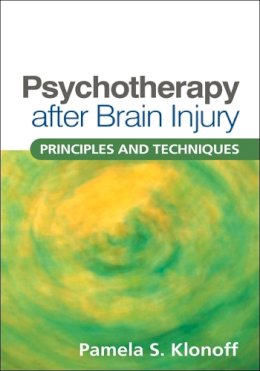
Stock image for illustration purposes only - book cover, edition or condition may vary.
Psychotherapy after Brain Injury: Principles and Techniques
Pamela S. Klonoff
FREE Delivery in Ireland
Description for Psychotherapy after Brain Injury: Principles and Techniques
Hardcover. Presents hands-on tools for addressing the multiple ways that brain injury can affect psychological functioning and well-being. Num Pages: 288 pages, black & white tables, figures. BIC Classification: MMJT. Category: (UP) Postgraduate, Research & Scholarly. Dimension: 260 x 190 x 25. Weight in Grams: 722.
This book presents hands-on tools for addressing the multiple ways that brain injury can affect psychological functioning and well-being. The author is a leader in the field who translates her extensive clinical experience into clear-cut yet flexible guidelines that therapists can adapt for different challenges and settings. With a focus on facilitating awareness, coping, competence, adjustment, and community reintegration, the book features helpful case examples and reproducible handouts and forms. It shows how to weave together individual psychotherapy, cognitive retraining, group and family work, psychoeducation, and life skills training, and how to build and maintain a collaborative therapeutic relationship.
Product Details
Publisher
Guilford Publications United States
Place of Publication
New York, United States
Shipping Time
Usually ships in 4 to 8 working days
About Pamela S. Klonoff
Pamela S. Klonoff, PhD, ABPP-CN, is a faculty neuropsychologist and Clinical Director of the Center for Transitional Neurorehabilitation, Barrow Neurological Institute of St. Joseph's Hospital and Medical Center, Phoenix, Arizona. She has been affiliated with the program since 1986. Dr. Klonoff is board certified in Clinical Neuropsychology by the American Board of Professional Psychology. She specializes in outpatient milieu-oriented neurorehabilitation, ... Read morewith a particular interest in psychotherapy with patients and their families after brain injury. Dr. Klonoff has published many articles and presented theoretical and clinical papers around the world; her expertise and research focus on holistic neurorehabilitation, including psychotherapy and cognitive retraining after traumatic and other acquired brain injury. Show Less
Reviews for Psychotherapy after Brain Injury: Principles and Techniques
"Klonoff is a talented therapist who combines a wealth of experience and expertise with a deep personal commitment to the process of assisting individuals and families in the challenging process of adjustment following brain injury. This extraordinary volume guides the reader through assessment, diagnosis, and treatment, illustrating the course of therapy with many practical examples. It is essential reading for ... Read moreprofessionals working in brain injury rehabilitation or with clients who have experienced a brain injury, and an invaluable resource for students and trainees in clinical psychology, clinical neuropsychology, rehabilitation medicine, neuropsychiatry, and social work."
Linda Clare, PhD, Professor of Clinical Psychology and Neuropsychology, Bangor University, United Kingdom "Klonoff provides a window into the unique world of brain injury, where psychology and biology intertwine. What is remarkable about this book is its level of detail. It delineates step by step the goals, tasks, and challenges of each stage of recovery, and features forms, checklists, and lists of adjunctive resources. Excellent case material illustrating both successful and unsuccessful treatment brings the work alive. A welcome resource for treating clients who have experienced any type of brain injury."
Robert Taibbi, LCSW, private practice, Charlottesville, Virginia "An impressive accomplishment. The author is a sure-footed, experienced clinician who shows how to guide clients in their arduous climb toward optimal rehabilitation outcomes. She addresses the client's need to regain functional competence and a feeling of 'belonging,' reconstitute a sense of self, accept limitations posed by the brain injury, and find meaning in postrehabilitation attainments. Many suggestions for facilitating essential compensatory processes are included. This book should become part of the reference library of both novice and seasoned practitioners in the field of neuropsychological rehabilitation."
Yehuda Ben-Yishay, PhD, Director, Brain Injury Day Treatment Program, Rusk Institute of Rehabilitation Medicine, New York University - Show Less

.png)